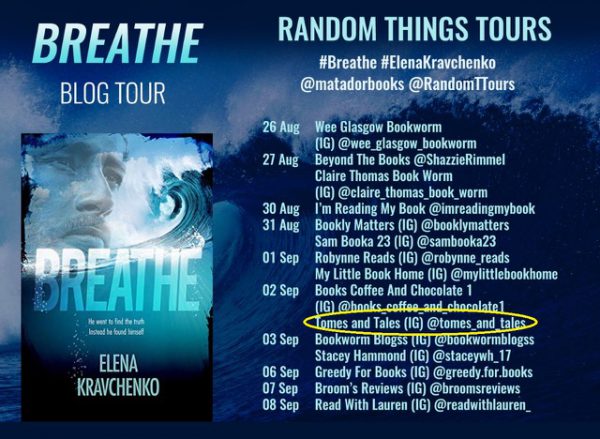BANGKOK, 16 September 2021: The Indian Ocean tsunami, 26 December 2004, leaves behind devastation in its wake. Carl travels from London to Thailand, only to learn there is nothing one man can do. In its unique combination of action and philosophy, Breathe turned out to be a surprise! I had expected a novelization of true events, but Elena Kravchenko delves so much more into the tragedy and its outcome.
The story kicks off with high-flying corporate employee Carl listening to news about the tsunami in Thailand. His best friend Kristoffer and the latter’s wife Eva are in the country for their honeymoon. On an impulse, and fearing the worst, he decides to travel to Thailand to bring them back himself. It’s only when Carl exits the airport in Thailand does the magnitude of the tragedy hit home.

On its surface, Breathe is about the disaster that went down in history as something the world was unprepared for. Thailand being a tourist destination and the tsunami striking at Christmas-time, several nationalities were affected with no immediate assistance on account of the holidays. Governments were pulled up for not responding adequately, bureaucracy hampered rescue operations, hospitals were ill-equipped, foreigners prioritized over natives, morgues and burial grounds overflowed with corpses.
Kravchenko touches themes like European entitlement, where white people with scratches and bruises were offered lavish treatment at the expense of Thais with severe injuries and gaping wounds; secondary and tertiary death waves caused by gangrenous wounds, bacterial and viral infections from rotting corpses; increase in theft, where even corpses were robbed of jewellery; survivor tourists being stranded with no passports or money; deceased of Asian origin mistaken as Thais and not having their own embassies contacted; incorrectly spelt names affecting identification of bodies; well-meaning individuals and organizations delaying rescue efforts through their own interference.
The initial chapters of Breathe alternate between Carl’s perspective of travelling from London to Thailand and Kristoffer’s perspective of life on the island before the wave hits. Gradually the reader is provided with only Carl’s side of the story, as we expect the worst, just like the protagonist. The primary narrative is interspersed with Carl’s memories of his best friend, and we learn why this quest is so important to him. I loved the development of every character, however small or big, with each one contributing to the story at large.
And of course, the main character in Breathe is the water itself! Whether the sea emptying out and sucking kayaks towards the ocean, or waves as high as 3-storey buildings; corpses thrown ashore or trapped in mangroves; death from drowning in the wave or from infections from stagnant water – the water is all around without being overtly written about. Through Carl’s reminiscences, Kravchenko brings up swimming, kayaking, sailing, surfing, a plethora of water sports and water-based activities. And the heart-wrenching realization hits that however great a swimmer one might be, or love the water, the water itself doesn’t care. Nature always shows us our place.
The fictional account is supplemented with information about earthquakes in the Pacific belt and tsunamis in the Indian ocean, why the tsunami of Thailand is historically significant, special emphasis on Swedes being the worst hit nationalities outside Asians, the repercussions of the tsunami from Burma to Indonesia and Africa, the importance of photojournalism in bringing light to tragedies around the world.
Breathe is well-researched, superbly written, moving and hopeful. Elena Kravchenko has based the novel on her own experience of losing friends in the tragedy, and the heartache comes through, as does the hope that life will go on with the memories of those we love. The book is peppered with beautiful quotes and is one to be cherished in the collection for the topics it addresses, the superior writing quality, and its lingering aftereffects.
In reference to her novel that took over a decade to write, Elena Kravchenko shares:
“In December 2004, I was in Thailand, planning to spend Christmas and New Year at a friend’s house in Phuket, but at the last moment, I changed my mind and left. So I never met ‘Kristoffer’ and ‘Eva’. I wish I did because I heard so much about them from ‘Carl’ – the book is inspired by his story.
In 2012, I went to remote Koh Prah Thong and, by pure accident, met Kimina and JP, tsunami survivors and owners of one of the bungalows at the resort. They met Kristoffer and Eva, and they remembered meeting Carl in Kurabury. Together, we kayaked into an endless maze of the mangrove creek. I felt all these events were like beads that lay in my hand waiting to be threaded into a story – the story of Breathe.”
Breathe was released on 28 April 2021 by Threesixty Publishing and is available as a paperback and ebook.

Book review by Renata Pavrey – writer, poet and founder of Tomes and Tales, a bookish venture dedicated to all things literary. (https://tomesandtales365.wordpress.com/)







